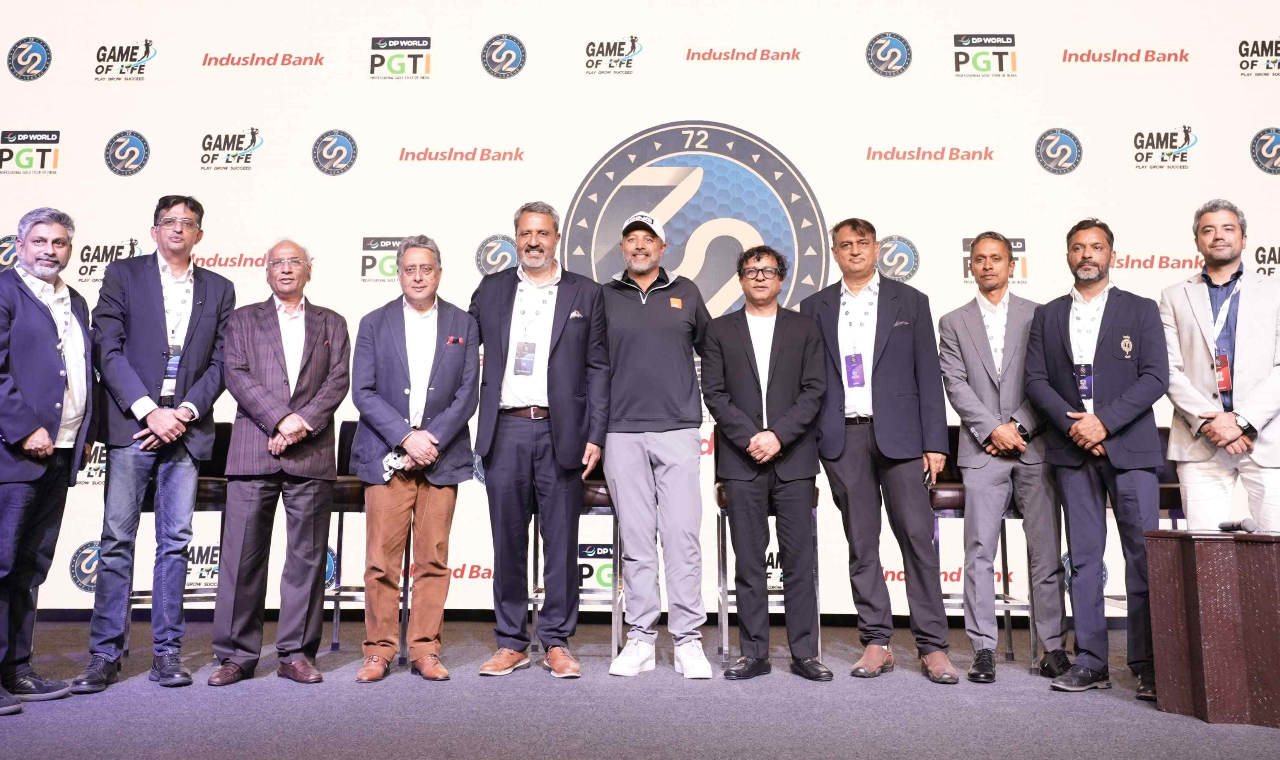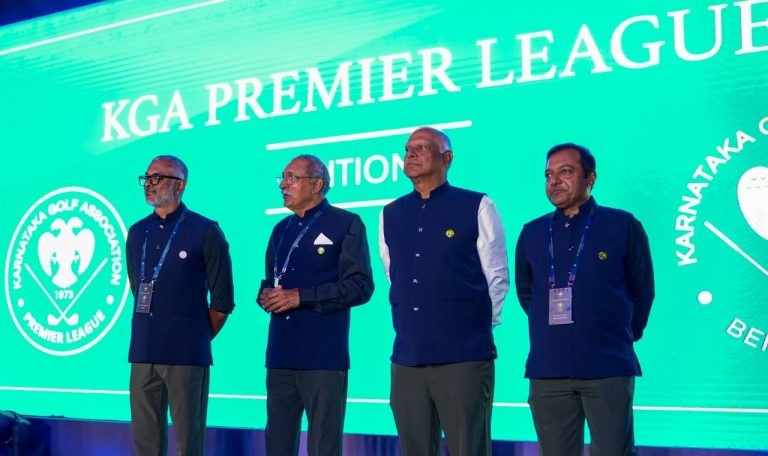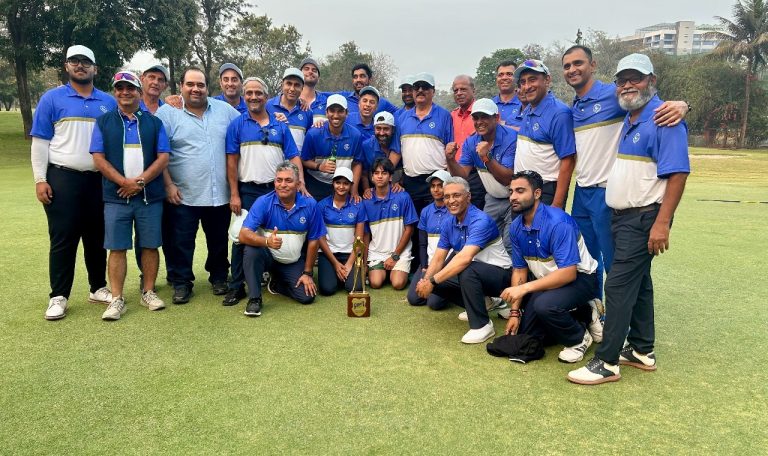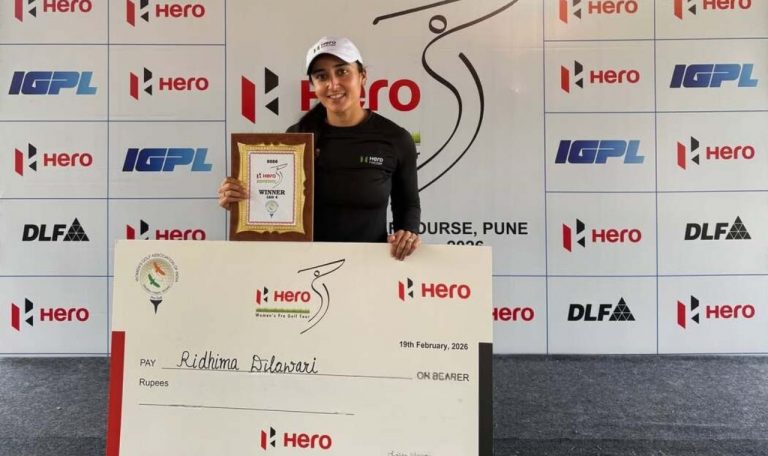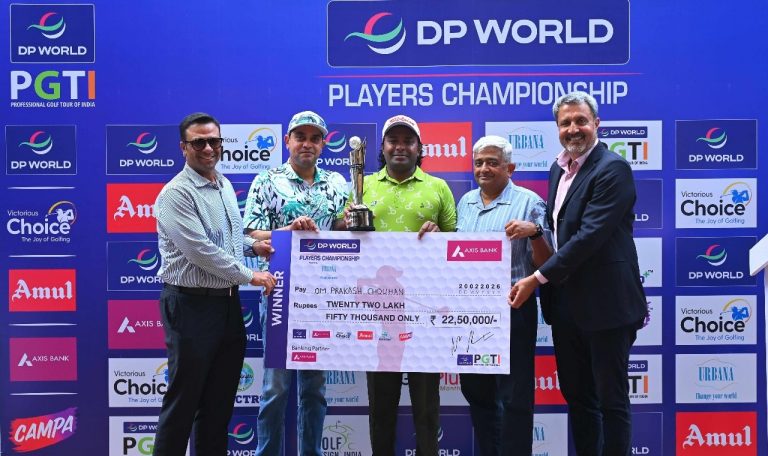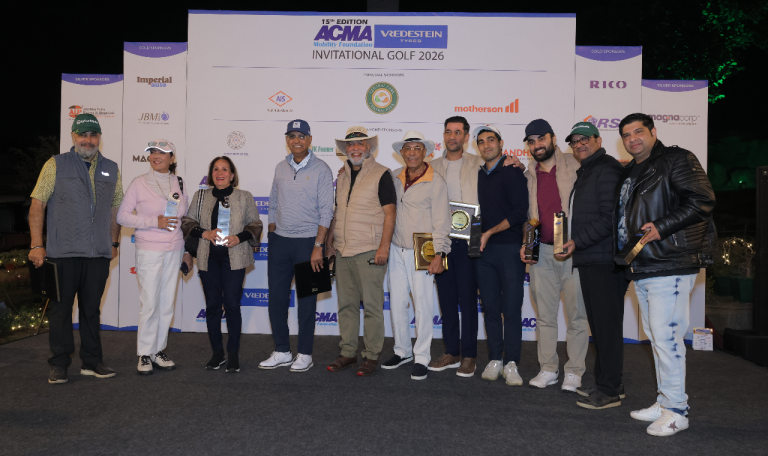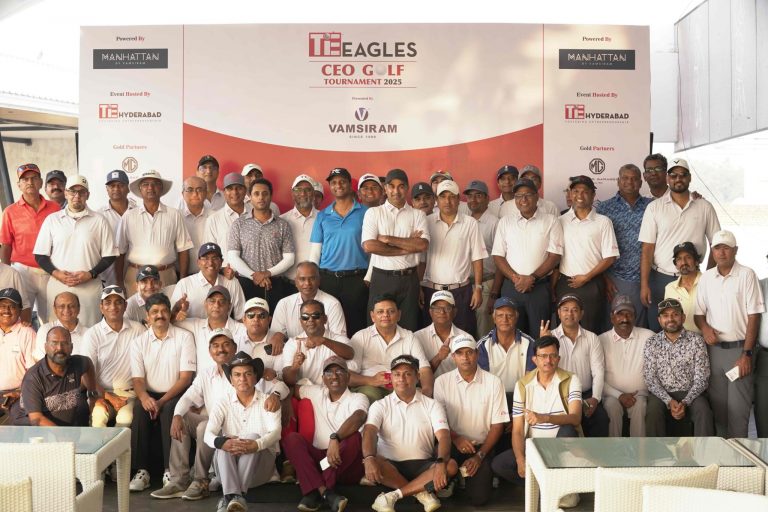From encountering social discrimination as a resident of resettlement colony Lajpat Nagar in Delhi and being the son of a lottery ticket seller to once being the highest individual taxpayer in the country, the capital’s Ashwani Khurana has set an example of how being determined can re-shape your destiny.  Being a strong believer of Karma, Ashwani dons the hat of tree-man and environmentalist besides being the proud owner of Karma Lakelands, which was awarded by Golf Digest India for Best “Eco-friendly Practices” among Indian golf courses at the India Golf Expo 2016.
Being a strong believer of Karma, Ashwani dons the hat of tree-man and environmentalist besides being the proud owner of Karma Lakelands, which was awarded by Golf Digest India for Best “Eco-friendly Practices” among Indian golf courses at the India Golf Expo 2016.
Golf Digest India caught up with Ashwani at his office-cum-residence in Vasant Kunj, in South Delhi, an 8-acre property which is home to numerous cows, goats, rabbits, ducks, and even bees! And of course so many trees. Excerpts from the interview:
How did you come about the thought of building a golf course?
It all started in 1989 when my friends and I acquired land on the outskirts of Gurgaon to make a farmers community. There was never a plan we had in mind on what was to be done with the land and hence I eventually bought their share with just one thought that I will plant lots and lots of trees there. Typically, this was the story of a horse before the cart. I had no business plan for the property at that time but I have always been a firm believer in karma. That karma has its own way around things and it’s most powerful than anything else.
 Eventually with my lottery business doing wonders, I acquired a lot of neighboring lands with the sole aim of planting more trees. Then at one point, we came to know that Haryana Govt. has a huge parcel of land adjacent to our property where they had plans of a development, now called IMT and on the other side we were flanked by National Security Guard (NSG) black cat commando facility. There was a clear plan of the Govt. to acquire abutting lands to expand the IMT. One of the ways to keep the Govt. at bay from the acquisition was to build a low density, low rise development such as a golf course resort and that’s how Karma Lakelands came into existence.
Eventually with my lottery business doing wonders, I acquired a lot of neighboring lands with the sole aim of planting more trees. Then at one point, we came to know that Haryana Govt. has a huge parcel of land adjacent to our property where they had plans of a development, now called IMT and on the other side we were flanked by National Security Guard (NSG) black cat commando facility. There was a clear plan of the Govt. to acquire abutting lands to expand the IMT. One of the ways to keep the Govt. at bay from the acquisition was to build a low density, low rise development such as a golf course resort and that’s how Karma Lakelands came into existence.
What are some of the key challenges faced during the development of Karma?
There has been an immense amount of challenges but I have sailed through them with a smile on my face. There were major attempts by Govt. to acquire the land even after the approval. The Govt. wanted to build a high tension power line that would bisect the existing and completed golf course to supply IMT with electricity. We proposed if they can look at re-routing the power lines but we eventually had to get a court restraining order against the Electricity department.
The Govt. at one point responded by invoking section 4 which meant that they intended to acquire. Those were tough times as a lot of investment had gone into it. But I was not going to lose Karma Lakelands as I am very passionate about what I do & eventually, Govt. saw the sense in what we said and backed out.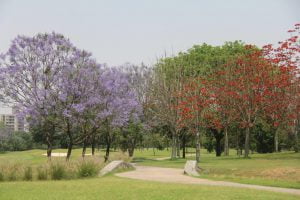
Which course designers did you consider for the Karma project?
There were a couple of American & European golf course designers before I met Phil Ryan & his team from Pacific Coast Design. I saw a genuine respect for existing site conditions and a drive to improve the environment. They clearly understood the dynamics of the feasibility of a golf course against the feasibility of the holistic project. They wanted to utilize minimum water and be a minimal burden on natural resources and that’s where I saw the fit.
[pullquote]I even met a few signature golf course designers as well and realized that “signature: charges, let’s say, $1 million and then another half a million for the design part. So if you do a similar design without the signature it will cost you a million less.[/pullquote] Interestingly Phil has been the backbone designer for a few “signature” designers and had all the qualification & capabilities to come up with a world-class design.
We know Karma Lakelands is one of the most eco-friendly courses in the country. What eco-friendly practices have you undertaken at the course?
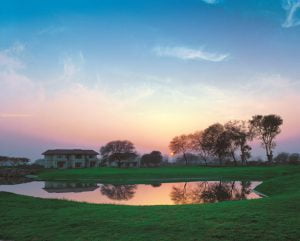
[pullquote]The entire property at Karma Lakelands, be it the golf course, the residential properties, the clubhouse, and other aspects that exist on the site are all incidental to the larger purpose of having an eco-responsible community. [/pullquote]First of all there are numerous full-grown trees on the property, and I believe trees are of utmost importance given the atmosphere in this region.
The entire campus is a no-horn zone as part of the eco theme. The guards respond to sight and not sound and this makes them even more alert.
In addition, the entire golf course at Karma Lakelands is a smoke-free zone. Even the staff before they are hired are asked to declare if they indulge themselves in smoking, pan masala etc because we don’t want cigarette butts and pan masala sachets flying around the property. There is complete rainwater harvesting, which means that not a single drop of rain is wasted and all rainfall is channeled into collection points for use across the campus and course. There is wastewater and green waste (fallen leaves and grass) composting. Bio-treated sewage from the property is combined with green waste to encourage and speed up the creation of compost for use.
When did environmental preservation become a lifestyle choice for you?
It started in my younger years. As my family had moved from Pakistan after the separation, I grew up in a resettlement colony in Lajpat Nagar in Delhi. There were numerous instances especially during festivals like Holi and Diwali where I felt that our way of celebrating these events was not respectful of nature. We see this even today. However, as a 14-year-old, it made a lasting impression on me.
[pullquote]Somewhere around 1985, I met Nek Chand, the gentleman who created the fabulous Rock Garden in Chandigarh and I invited him to this piece of land that I had recently acquired – 8 acres in Vasant Kunj, Delhi which is my home-cum-office now. [/pullquote]It was in bad shape with clayish soil and infinite holes in the ground. I requested him to help me plan the landscaping and plant trees etc. as I had no practical knowledge at the time. When I saw the plants growing in the next few months, I was blown. Something overwhelmed me immensely. Looking at these trees, my reaction was the same as when you see your child grow. The joy, the bliss, it can’t be put into words and this is how I became the lover of trees. Not too long after that, I vowed that I will give myself 10 years’ time to grow 100,000 trees… and I did achieve that goal!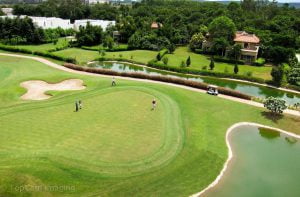
I kind of coined a self-guiding principle – Greening like charity begins at home but it shouldn’t end there.
So I started adding trees to my driveway, then opposite my home, there is a public park, which was a piece of brown earth. I adopted it for greening and today it is a mini forest.
I settled on doing something that is closest to my heart – the environment. It all started with trees but I soon moved on to water harvesting, biodegradation of compostable city waste- the other aspects of the environment. I am blessed that this is what I practically do for a living today.
What plans do you have for Karma Lakelands?
[pullquote]Karma Lakelands in the near future will have 1000+ apartments and 270 villas with complete water and waste management. The motto is eco-responsible community living.[/pullquote]
We have not sold out many villas for the 10 years that we’ve been in the market. There was a time when we signed up with a Real Estate developer, one of the most popular ones in the country, but it turned out to be a bad marriage. When you are in a bad marriage, you don’t make more babies.
We have just ended that relationship and currently are on our own but plan to tie up with a developer with the same core values. I don’t really view optimization of return on investment as a value; it can be a reward for your values. We are very clear on this.
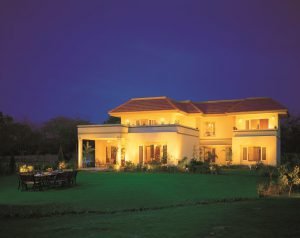 Do you have more golf-related projects in the pipeline?
Do you have more golf-related projects in the pipeline?
We are a single project company and this is how I always intended it to be. Every other property or investment has been diluted with a single-minded focus on Karma Lakelands project.
But my beautiful children are growing up and they are starting their own things. I will not stop them in their individual pursuit but I am very set and satisfied with this one project that I have. I will continue to work towards it with the fullest intensity possible.
What advice or learnings would you share with other developers looking to build golf-related properties?
The only advice to the entire golf course community of the country and beyond is to understand that it makes aesthetic as well as commercial sense to adopt green practices and that’s what we represent.
The satisfaction that you get when your green practices come to fruition is much more than any ROI can ever be. When you work with passion, rewards are instantaneous, you don’t have to wait till the end of a financial year for your rewards.
Earlier you ran a successful lottery business, which resulted in you becoming the highest individual taxpayer of the country. How did all that start?
Mine was a difficult childhood. My father somehow put resources together and sent me to an English medium school – St. Anthony Public School — which was a big deal at the time. While I was from the low rung society of Lajpat Nagar, most of my peers in the school came from far more elite places in Delhi. I was equally put down by the peer group and judgmental behavior of teachers.
Things like family not speaking English at home, hailing from a resettlement area of Lajpat Nagar, dad’s business
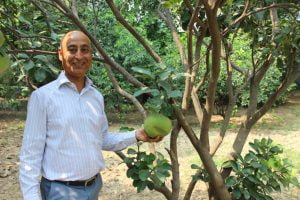
of selling lottery tickets on a bicycle — all this worked against me in school and I was treated badly. The teachers made fun of me, calling me a raffle-man. They used to threaten me to give them a winning lottery ticket otherwise I’d be caned. There was this nasty teacher who meant it and he actually did cane me as I didn’t get the raffle ticket for him. It took some time but I was resolute despite all adversity. I decided that I am going to grow up and be in the lottery business. I entered the business with great passion and succeeded.
I believe that it is not what you do for a living but your true motivation to do it that makes a difference. These are the few episodes that shaped me to grow up into an internally strong person that I am today. I am also a devout follower of Sadhguru Jaggi Vasudev who has been my guiding force.








